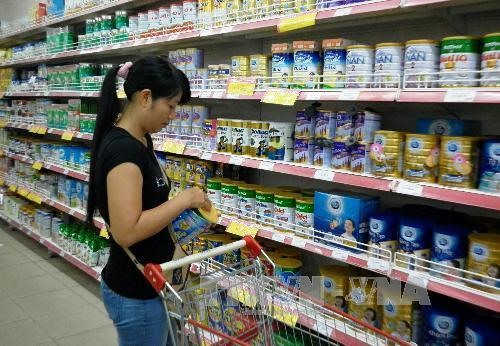Ninety companies have signed up for HCM City’s price stabilisation programmes this year and the 2019 Lunar New Year, two more than last year, according to the city Department of Industry and Trade.

Ninety companies have signed up for HCM City’s price stabilisation programmes this year and the 2019 Lunar New Year, two more than last year, according to the city Department of Industry and Trade.
Speaking at a meeting on Thursday, Nguyen Nguyen Phuong, head of the department’s trade management division, said: “Though the number of participating firms increased by just two compared to last year, the supply of goods will be 30-35 per cent higher than last year.”
The city is simultaneously implementing four programmes to stabilise the prices of essential foods and foodstuffs, school supplies, dairy products, and medicines for a year starting on April 1.
The products will account for 25-40 per cent of market demand, an increase of 15-35 percentage points from last year.
For instance, under the programme for essential foods and foodstuffs, 10 groups of goods -- rice, sugar, cooking oil, poultry and cattle meat, poultry eggs, processed foods, fruits and vegetables, seafood, and spices – are sold at stabilised prices.
This year, for the first time, spices are included in the list of essential goods.
The products will meet 25-35 per cent of demand, rising to 30-40 per cent during Tet.
In the school supplies programme, 103 types of products (22 more than last year) are covered, with over 17 million notebooks, 570,000 uniforms, over 1.86 million schoolbags and backpacks and 920,000 pairs of shoes set to be sold.
The two remaining programmes stabilise the prices of formula milk for babies and pregnant women, milk powder and milk fortified with micronutrients, 21 medicine groups, 176 active ingredients, and 383 items, accounting for 50 per cent of the market for essential drugs.
All products are sold at 5-15 per cent lower than market prices.
This year 12 banks have signed up for the programmes, three more than last year, and they would lend VND19.65 trillion (US$861.8 million) to the participating companies at interest rates of 5.5-7 per cent for short-term loans and 9-10 per cent for medium- and long-term loans, Phuong said.
The State Bank of Viet Nam has said the banking sector would continue in the programme next year.
This year the SBV and the department would strengthen the programme that brings banks and businesses together for the latter to borrow for production and distribution, thus enabling a stable source of supply of goods for the city, he said.
A HCM City Export Processing and Industrial Zones Authority official said workers in industrial parks have great demand for price-stabilised products, and called for more mobile sales trips to these areas.
Nguyen Quynh Trang, deputy director of the department, said the department would work with businesses every year to ensure the products they supply to the market are of high quality and preferred by customers.
“We hope that through the programme businesses will focus on improving their production capacity and product quality.”
The programme has benefited both consumers and producers in the past, and more and more firms are signing up.
They have contributed greatly to developing distribution channels for Vietnamese products and the “Vietnamese people give priority to using Vietnamese goods” campaign, controlling inflation and ensuring social security, the department said.
There were 10,602 outlets selling price stabilised goods by the end of last year, an increase of 1,397 compared to 2016. — VNS





